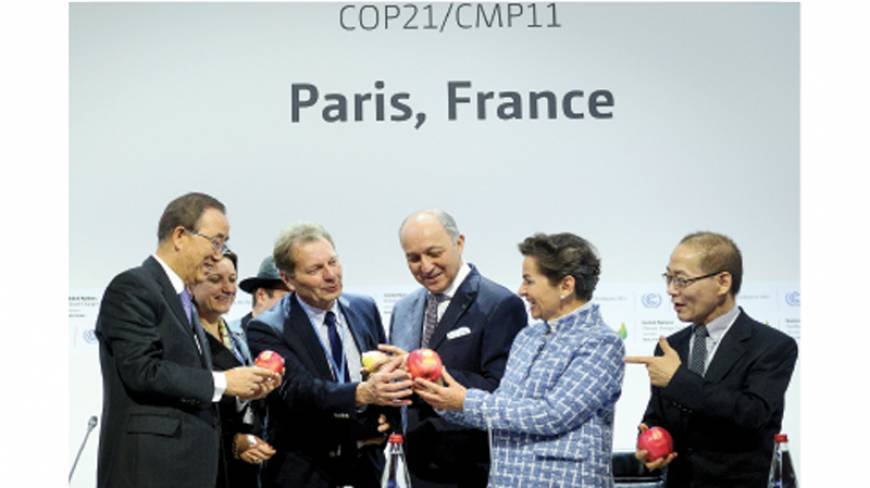The high-level segment of climate negotiations began in Paris yesterday, with a call for ministers to work hard to remove roadblocks that still remain in the draft text of the climate agreement.
A host of unresolved issues remain, confined within brackets of the draft text, after hectic negotiations in the first week of COP21.
Developing a financing mechanism for adaptation to climate change impacts and mitigation of greenhouse gas emissions will take centre stage during the next couple of days.
The parties have been asked to submit a final draft of the agreement by Wednesday so that leaders can give it a final check before finalising the agreement on Thursday.
After that, the text will be translated into the six UN official languages to be adopted on Friday, Laurent Fabius, the COP21 president, said at a press conference yesterday.
UN Secretary-General Ban Ki-moon said at the COP21 high-level session: “We don’t have a Plan B because we don’t have another planet. Climate change carries no passport, it has no boundaries. Your task is to translate this historic call for action into a durable, dynamic, credible and fair climate agreement.”
“Political momentum like this may not come again,” Ban told a press conference later in the day.
He said there were still many brackets in the text, but said member states had expressed a strong commitment to removing obstacles. “I’m sure with the leadership of the COP21 presidency, a final text will be ready by Wednesday.”
The agreement must be “universal, strong and robust,” he said. This needs an “ambitious level of agreement” that has never before taken place in history, the secretary general added.
“There will be a much cleaner text by Wednesday for leaders to consider on Thursday, before finalisation of the agreement on Friday,” he said.
Replying to a question, Ban said this will be a binding agreement – binding not internationally, but nationally. “The main part [of the agreement] will be binding and some elements will, however, not be binding.”
The new text contains two parts: a compilation of the work conducted in all the working groups over the first week and a “reflection note” containing all the comments delegations made on the text Friday afternoon and Saturday morning.
The UN secretary general maintained that the review of the agreement would take place internationally. “The first review will have to be by 2020, and then every five years.”
Addressing another press conference, UNFCCC Executive Secretary Christiana Figueres said the French presidency wants a text to be ready by [Tuesday night]. “This should be on the table on Wednesday. We are at the very exciting moment.”
Fabius called the week ahead the “week of hope.”
“We still have significant work to be done this week” based on the draft adopted last week, he said. “There are still many issues in the brackets.”
Speaking at the opening session, President of the UN General Assembly Mogens Lykketoft said that while 2015 was all about reaching agreements, the year 2016 would be about their swift implementation.
He said he would be organising an event in New York in April to help realise the Sustainable Development Goals agreed this year. The meeting, including government and civil society, would spark many new initiatives.
This follows last week’s announcement by the UN secretary general of an event in Washington, in May, to accelerate cooperative climate initiatives.
“While this [first] text is still a draft, the emergence of a party-owned proposal was far from a given,” said the Climate Action Network in a statement. It said Switzerland contrasted the current negotiations with those in Copenhagen in 2009, where insufficient transparency and party ownership notoriously undermined the process.
At the plenary, Fabius laid out the process for week two. “Committed to a transparent and inclusive process, the presidency will facilitate one open committee to discuss the following topics: differentiation, ambition, means of implementation, Workstream Two, and loss and damage. A separate group will discuss legal issues.” This group began its work on Sunday and continued yesterday.
As the We Mean Business analysis explained, the draft Paris agreement contains the elements of an ambitious outcome that would catalyse business action in favour of low-carbon, climate-resilient development.
The vulnerable nations supported a “coalition of ambition,” while emerging economies stressed the importance of differentiation in the new agreement.
Source: Dhaka Tribune









